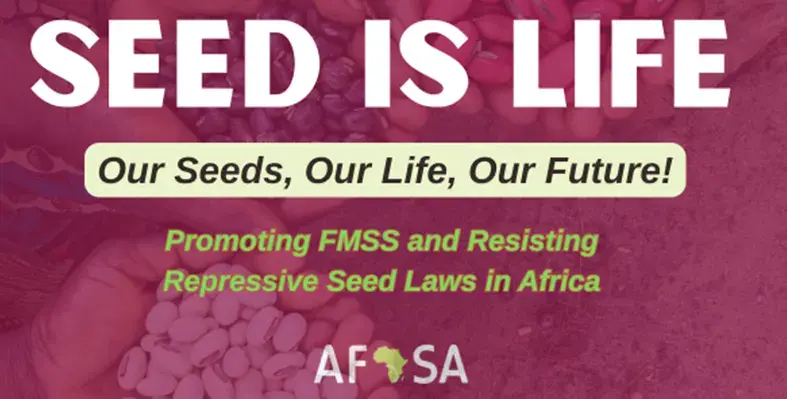The Alliance for Food Sovereignty in Africa (AFSA) ran a three-day social media launch from 24-26 April under the banner 'Seed Is Life'
With current seed laws being repressive and corporate-driven, the campaign themed 'Our Seeds, Our Life, Our Future: Promoting FMSS and Resisting Repressive Seed Laws in Africa,' focused on Farmer-Managed Seed Systems (FMSS), thereby sparking a full-fledged movement across the continent.
The campaign allowed AFSA to reaffirm its commitment to seed sovereignty, stand for farmers' rights and ensure that Africa's rich agricultural heritage remains untouched by corporate capture. AFSA also took to social media to emphasise the role that farmers play in providing seeds that feed Africa and help sustain agricultural biodiversity. Moreover, the campaign promoted FMSS as the foundation of food sovereignty and sustainable food systems.
Throughout the campaign, AFSA delivered four key messages:
- FMSS is being targeted despite providing 80-90% of seed for food crops in Africa.
- Seeds represent culture, resilience and sovereignty, with planting, saving and exchanging them seen as acts of survival, tradition and innovation.
- UPOV-aligned seed laws and PVP regimes that seek to outlaw farmers’ seeds and criminalise seed sharing must be resisted.
- FMSS must be legally recognised and supported since it encourages seed soverignty. This means that farmers define, manage and govern their own seed systems.
"Seeds are not merely commodities to be privatised; they are living heritage," said AFSA seed working group chair and advocacy coordinator of SKI, Frances Davies. "Farmers Managed Seed Systems (FMSS) are complex ecological and socio-economic systems. They form the foundation of our entire food system, and are vital for preserving genetic diversity, adapting to climate change, and securing the future of life," Davies added. "We need dedicated policies to recognise and support these systems, rather than criminalising them to protect the market interests of corporate agribusiness”
AFSA general coordinator, Dr Million Belay called the campaign a 'call to action,' highlighting that safeguarding the seeds of the past and present forms the backbone of Africa's future.





